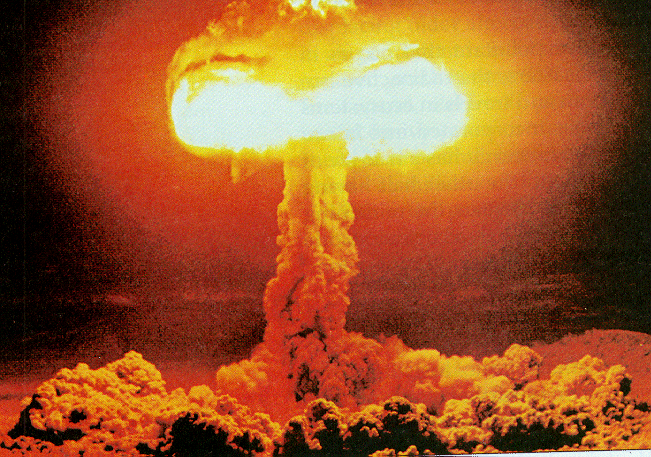 I was driving down the coast this weekend and caught an episode of
On The Media
where I heard a very interesting story about William L. Laurence who
was a Pulitzer Prize winning journalist in the 40's that was basically
a shill for the government to promote the use of the atomic bomb. It's
really disturbing to know that he wrote for a paper I respect and he
even got praised for his work. Here is an excerpt of the transcrīpt
which is an interview with David Goodman who co-authored a book called "
Exceptions To The Rulers" in which he calls for a posthumous revoking of the Pulitzer Prize to Mr. Laurence.
I was driving down the coast this weekend and caught an episode of
On The Media
where I heard a very interesting story about William L. Laurence who
was a Pulitzer Prize winning journalist in the 40's that was basically
a shill for the government to promote the use of the atomic bomb. It's
really disturbing to know that he wrote for a paper I respect and he
even got praised for his work. Here is an excerpt of the transcrīpt
which is an interview with David Goodman who co-authored a book called "
Exceptions To The Rulers" in which he calls for a posthumous revoking of the Pulitzer Prize to Mr. Laurence.
From On The Media:
BOB GARFIELD: Who was William L. Laurence?
DAVID GOODMAN: Laurence was an immigrant from Eastern Europe. He was a science reporter for the Times. He won his first Pulitzer Prize in 1937. And he became a staunch advocate of the atomic bomb long before the atomic bomb was ever dropped. Throughout the 1930's he was advocating for research into the use of atomic power, such that he earned a nickname, "Atomic Bill."
BOB GARFIELD: So when the War Department was looking explicitly for a working newspaperman to help mold public opinion about the bomb, natural choice.
DAVID GOODMAN: Indeed. General Leslie Groves, who was the military director of the Manhattan Project, scientists who researched and created the bomb, his own words were that he was looking for a "suitable newspaperman" to tell the story of the bomb to the public, to put the language of this arcane science in laypeople's terms. So in March 1945 there was an extraordinary secret meeting held at the offices of the New York Times, in which General Groves came to meet with William Laurence and asked that he become a special consultant to the War Department.
BOB GARFIELD: David, there is one brief passage in a piece by Laurence as he flew in the plane that was about to drop the bomb on Nagasaki, that is an astonishing window into his frame of mind. Can you read that for me, please?
DAVID GOODMAN: What Laurence wrote was that he felt no, quote, "pity or compassion for the poor devils" who were about to die. And he went further because his compassion was reserved for the bomb itself. When the bomb detonated, quote, "Awe-struck, we watched it shoot upward like a meteor coming from the earth instead of from outer space, becoming ever more alive as it climbed skyward through the white clouds. It was a living thing, a new species of being, born right before our incredulous eyes."
BOB GARFIELD: Now the story goes beyond Laurence reporting, with an obvious conflict of interest, about the dropping of the bomb. It gets far more sordid because when the news of radiation disease began to leak out, the War Department went into full defensive mode and used Laurence to publish, in effect, disinformation. Tell me about that.
DAVID GOODMAN: General Groves handpicked a group of journalists to accompany him not to Hiroshima and Nagasaki, but to the bomb site out in New Mexico where the first bomb was detonated. And it was there that William Laurence wrote what General Groves had wanted him to write. Laurence, quoting General Groves, writes, "The Japanese claim that people died from radiation. If this is true, the number was very small." Laurence continues in his own editorializing in the story. He writes, "The Japanese are still continuing their propaganda, aimed at creating the impression that we won the war unfairly, and thus attempting to create sympathy for themselves and milder terms. Thus, at the beginning, the Japanese described symptoms that did not ring true."
BOB GARFIELD: Sixty years later the dropping of the bomb remains one of the great historical controversies. What I find so stunning about this is that at the contemporaneous moment when the world had to make up its mind, the New York Times, in effect, became a propaganda tool of the U.S. government. And for this William L. Laurence and the New York Times were awarded a Pulitzer Prize.
DAVID GOODMAN: That's right. And the very debate that you elude to about was the atomic bomb an appropriate response, well Americans really wouldn't know if they don't know the reality of what happened on the ground. In our book we call for William Laurence's Pulitzer Prize to be stripped.